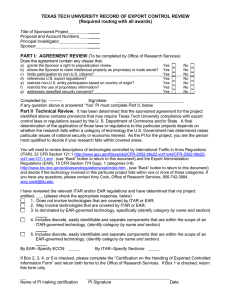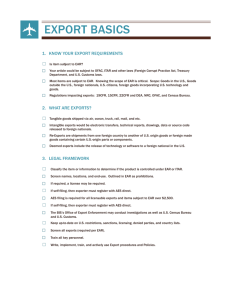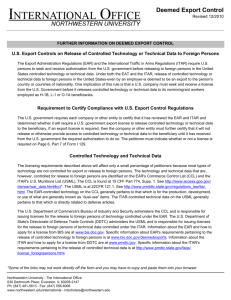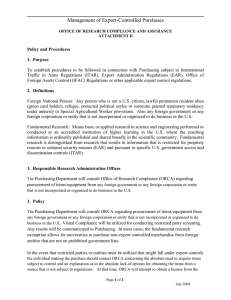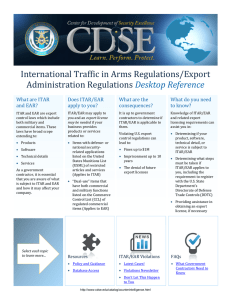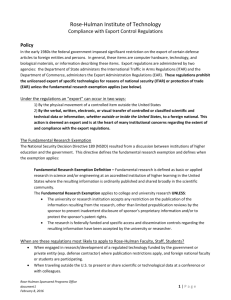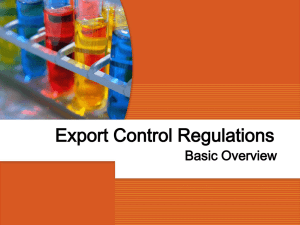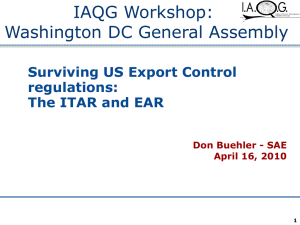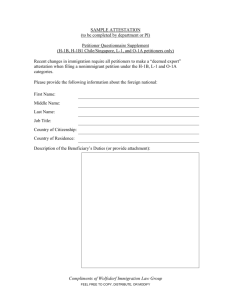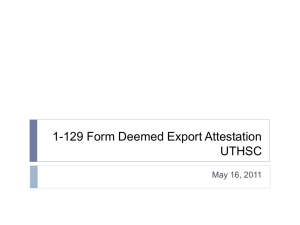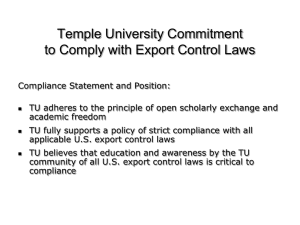OSP-OSA Training - Export Controls
advertisement
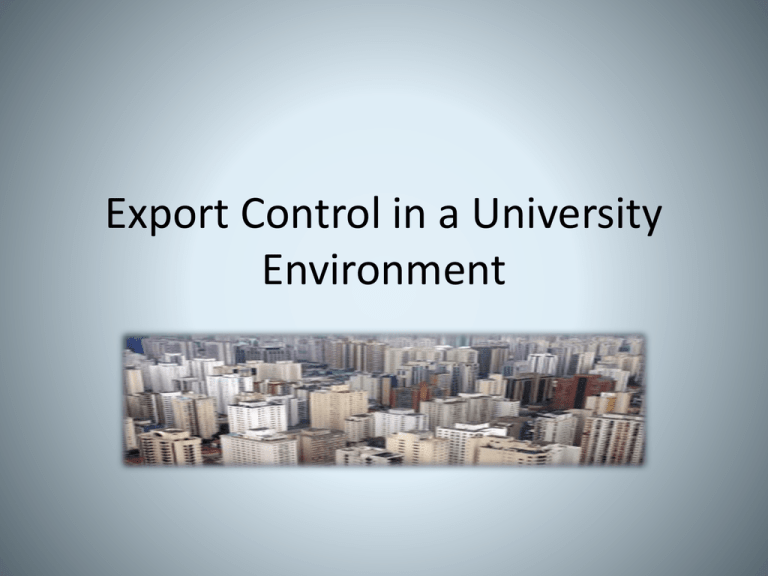
Export Control in a University Environment What is an export? • An item that is sent from one country (=country of exportation) to a foreign country (=country of destination). • Release of information relating to a controlled item to a foreign national (as defined by law) in the exporting country is deemed to be an export to the home country of the foreign national. Who is a Foreign Person? • Definition/interpretation vary amongst agencies but generally: - An individual who is not a US citizen, permanent resident or protected individual - all foreign corporations, business associations, trust, societies or any other entity or group (ex: a foreign university/lab) that is not legally incorporated to do business in the United States - international organization and any agencies or subdivision of foreign governments (ex: diplomatic missions). What do Export Controls usually cover? • • • • • • • • • • • • • Chemical, Biotechnology and Biomedical Engineering Materials Technology Remote Sensing, Imaging, and Reconnaissance Navigation, Avionics and Flight Control Robotics Propulsion Systems and Unmanned Air Vehicles Subsystems Nuclear Technology Sensors and Sensors Technology Advanced Computers/Microelectronics Technology Information Security/Encryption Laser and Direct Energy Systems Rocket Systems Marine Technology Areas of concerns for Universities • Downloading software • Transmitting technology/technical data via email, fax or during a phone conversation or a meeting • Releasing of technology/technical data or source code to a foreign national in the United States • Provision of defense services to a foreign person wherever the services take place • Re-export Agencies • State Department’s Directorate of Defense and Trade Control (DDTC) ITAR • Commerce Department’s Bureau of Industry and Security (BIS)EAR • Treasury Department’s Office of Foreign Assets Control (OFAC) Other things to keep in mind • Anti-boycott legislation (administered by BIS under the Export Administration Act –EEA-) – Examples of Boycott Requests: http://www.bis.doc.gov/antiboycottcompliance/o acantiboycottrequestexamples.html • Foreign Corrupt Practices Act (administered by the DOJ). Questions to ask • Am I exporting something? • Is the item a controlled item? • Do I have a legal exemption to export without a license? Exclusions - Items in the public domain - Artistic, non technical publications (children’s book) - Fundamental Research Exclusions (FRE) Key issues and risks • What is public domain? • Situations that invalidate the FRE • Faculty start-up funds and non-sponsored research • Equipment “use” • Software development • Shipping payments to foreign persons outside of the United States • Travel (TMP/BAG) Travel: restriction on what you can take • ITAR controlled articles, technical data, software (as defined under ITAR) without a license from the State Department • If you have ITAR-controlled technical data on your laptop you cannot take it outside of the US (even without intent to transfer it to a foreign person) • In most cases US and non-US persons can take EAR controlled items and software (including laptop and PDA using TMP or BAG • A US person can use the exception to take EARcontrolled technology but this does not authorize the transfer to someone not authorized to receive it TMP and BAG • When you leave the United States, everything you take is an export, including devices, software, and data. Personal effects (clothes, “articles of personal adornment”, toiletries, medicine, etc., “and their containers”) are generally covered by EAR’s BAG (personal baggage) exception. Personal electronic devices (laptop, tablet, PDA, flash drive), are typically subject to EAR. • If you own the device the EAR-BAG will allow you to take the device as a “tool of trade” • If Syracuse owns the device TMP exception allows you to take the device and software “for use in a lawful enterprise or undertaking of the exporter” to countries other than Cuba, (North) Sudan or Syria, with the condition that you must bring it back within a year What to do when you get there? • While US sanctions programs and restrictions on transactions with specific parties always apply, the likelihood of being affected by them increases when you’re outside the US. Cuba, Iran, North Korea, (North Sudan) and Syria are subject to strict controls on the EAR’s Commerce Control List, and are also subject to OFAC sanction programs. • Working with China entities and nationals can be complicated by US policy toward China, which includes both enthusiastic support for commercial transactions and strong aversion to support of the Chinese military. Some apparently benign China institutions are considered by the US government to be closely related to the military, resulting in restrictions on transactions with them. Real Cases • UMass Lowell was fined $100,000 for shipping an EAR99 atmospheric testing device to Pakistan. This wouldn’t ordinarily be a problem, but the recipient was indentified on the Commerce Department’s Entity List as ineligible to receive any items subject to EAR • Two shipments of experimental equipment were sent to Italy on twp carnets (temporary allowance of import without duty or VAT). The Italian researchers used the equipment and sent it back with one carnet. Italian and US Customs interpreted this as every piece of research equipment listed on the “other” carnet is still in Italy. MIT was fined $29,924.31 • A shipment of white phosphorous was sent to a UCONN PI as a gift by a colleague in Switzerland. In addition to be hazardous, white phosphorous is also used to make methamphetamine and controlled by DEA. The shipment could not be received by the PI or sent back to Switzerland. Custom charged UCONN storage fees ($200/day plus a $27,000 fine). • • • • Dr. Tom Butler-Texas Tech2 years of imprisonment3 years supervised release-$50,000 fine Shipped samples of Bubonic Plague via USPS to a colleague in Tanzania; lied on the shipping label to the FBI when questioned. • • • • Dr. Reece Roth-Univ. Tenessee Serving 4 years of imprisonment Took classified data to China to share at a conference Employed a foreign national to conduct research in his lab and allowed the foreign national to access restricted data • Asked a graduate student in the US to email him a data sheet through a Chinese colleague he was visiting in China • Resisted arrest at the Detroit airport and insulted the FBI agents who questioned him. Exercises • A Russian scientist from the University of Moscow is visiting SU for an international conference.- A PI at SU asks for her opinion on research involving a new technique using nuclear radiation for medical applications • The Russian scientist does not have the time to review the notes of the PI; she asks that the data be sent to her in Russia • The PI asks a graduate student to forward the information to the Russian scientist via email • A Chinese graduate student is working on a project with a professor from the school of engineering • Part of the research involves basic scientific trials but is using high-tech pulse lasers • The research is considered an FRE • The machine is considered controlled technology • The student used the equipment in a shared lab but independently • A professor in the department of Linguistics is studying a varaition of a Nubian language. • The professor goes to a conference in Vienna • At the conference he meets a professor of Linguistics from Sudan • He asks the professor to review the translation of selected sentences into a written form and ultimately into English • He promises to pay the professor $2,000 for the translation. • The University wire-transfers the payment to the Linguist in Sudan without requesting a license. • A professor in Earth Sciences is contacted by a graduate student at a major Iranian research university • The student found the professor's information on a paper she is using for her dissertation • The student asks the professor to read her dissertation and give her feedback • The professor engages in a conversation via phone and email and reviews the student’s dissertation • In turn the student attempts to ship to the professor fossils as a thank you for helping her. Q&A
